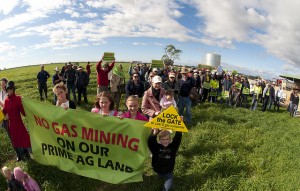High stakes for the climate in Australian national elections
This month, Adopt-A-Negotiator invited guest blooggers to report on the place of climate change in upcoming national elections in their country. Do political parties talk about climate during the campaign? Are there major differences on renewable energy and carbon pollution between the various political programs? Should we expect these differences to have an impact on the result of the elections?
Australians began 2013 with an ‘angry summer’ that broke 123 heat and extreme weather records.Yesterday was the last day of the warmest winter ever recorded in our eastern states. Global warming is already hurting people here.
We are one of the world’s top 20 polluting countries and the custodians of massive coal and gas reserves. Our coal deposits like Queensland’s Galilee Basin are mentioned in the same breath as Canada’s vast tar sands as a threat to global climate stability.
This means that the results of Australian elections matter to international efforts to cut greenhouse pollution.
Bizarrely, though, action on global warming has not featured significantly in national media coverage of this year’s federal election, which will take place on September 7.
This is largely because neither of the two largest political blocs want to do more. In different ways, both parties are campaigning against more ambitious action.
The leader of the conservative opposition, Tony Abbott, wants to cut billions of dollars of clean energy investment and repeal the successful Clean Energy Act, which charges major companies for their pollution.
Abbott’s replacement policy to pay big corporations to act is widely dismissed by both climate experts and neutral economists, but not all of his party mind: many members of his Liberal National Coalition don’t accept the science linking human greenhouse pollution to global warming.
Our other large political party takes a more complex position. After the 2010 election, the Labor Party government relied on Green and independent members of Parliament for a majority. As a condition of their support, the Greens and independents negotiated a detailed agreement to act on global warming with Labor in 2011.
The package included the Clean Energy Act, $10 billion in clean energy finance and much more. The International Energy Agency called Australia’s climate package ‘template’ legislation for developed countries.
Since 2011, however, Labor has cut more than $1 billion from the clean energy and environment programs in the package, and cancelled the agreed closure of dirty coal-fired power stations. At this election, Labor is proposing to lower the pollution price paid by big business by moving to full emissions trading one year earlier than planned.
This backwards step is especially disappointing from Prime Minister Kevin Rudd, who used to refer to global warming as “the greatest moral, economic and environmental challenge of our time”.
Only the Greens, Australia’s third party, have a comprehensive set of climate policies. Their platform includes plans to increase Australia’s clean energy use to 90% by 2030, stop the expansion of coal and gas exports, encourage community-owned energy projects and so on.
The Greens can claim much of the responsibility for Australia’s recent successes in climate policy, but they are being excluded from election debates by the two larger parties.
Because Labor and Liberal National agree on expanding coal exports and allowing gas mining under farmland, these topics have received little national media attention. They deserve more scrutiny: if planned coal and gas expansions go ahead, Australia will be the world’s largest exporter of carbon by 2020.
Despite the lack of national attention, local campaigns against the impacts of these expansions are making a big difference.
 Many farmers have ‘locked the gate’ to coal and gas mining, because of the risks it poses to their land and groundwater. Similarly, communities suffering from the health impacts of coal dust are organising for better protections and clean energy replacements.
Many farmers have ‘locked the gate’ to coal and gas mining, because of the risks it poses to their land and groundwater. Similarly, communities suffering from the health impacts of coal dust are organising for better protections and clean energy replacements.
At the same time, farmers, Traditional Owners, tourism operators and ecologists are building new alliances to stop major coal and gas port expansions in the Great Barrier Reef and the Kimberley.
These campaigns are already bearing fruit: some gas companies have already left regions when faced with strong community opposition and major port proposals have been delayed or shelved.
Still, even though these community campaigns will have an impact on election results in some districts, Australia looks increasingly likely to elect an Abbott government and therefore take a huge step backwards on climate policy.
It is possible that Australians will elect an upper house of Parliament that will stop Tony Abbott from repealing the package from 2011, but it is equally possible that minor parties of the populist right will hand an Abbott government the Senate majority it would need to unwind climate action.
Sadly, the best possible outcome - a lower house of Parliament with no large party in control, which would empower the Greens and other members in favour of stronger action - is now unlikely.
The government elected on Saturday will have significant global sway: Australia has just begun a turn as President of the Security Council, and will begin its Presidency of the G20 in November.
Let us hope that Australians make their choice with the rest of the world in mind.
Read about the role of climate change in the narratives of other upcoming elections:
Image credits: Max Phillips (Beyond Coal and Gas), Greens MPs




About the author
Josh Wyndham-KiddJosh Wyndham-Kidd is an Australian climate campaigner who attended the Poznan and Copenhagen UNFCCC conferences. He now works for Senator Christine Milne, leader of the Australian Greens.





